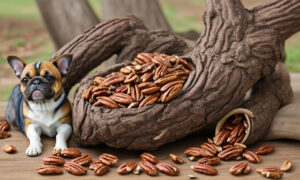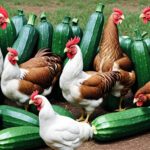As pet parents, the health and well-being of our furry friends is always at the forefront of our minds. With the rising popularity of incorporating fresh fruits and vegetables into our diets, it’s only natural to wonder if our dogs can also benefit from these nutritional powerhouses. Among the many options, the kiwi fruit stands out with its vibrant color and exotic taste, prompting the question: can dogs eat kiwi?
A Delectable Delight or an Uncertain Treat?
When we consider feeding our dogs something new, it’s crucial to first understand what benefits – if any – the food can offer them, and whether it poses any risks to their health. Kiwi fruit is known for its high nutrient content and potential health benefits for humans, but does it hold the same promises for our canine companions?
Nutritional Highlights of Kiwi Fruit
The kiwi – Actinidia deliciosa – is a nutrient-packed fruit originating from China. Below are its most remarkable nutrients:
Related article; can dogs eat cabbage
- Vitamin C: Kiwi is an excellent source of vitamin C, which is necessary for the growth, development and repair of all body tissues.
- Dietary Fiber: Essential for digestive health, fiber helps regulate your dog’s digestive system.
- Potassium: This mineral is necessary for the proper function of cells, tissues, and organs in the dog’s body.
- Antioxidants: Kiwi contains various antioxidants, which help protect the body from free radicals.
Weighing the Benefits against the Risks
As with any food that is not a regular part of a dog’s diet, it’s important to weigh the potential health benefits against any risks. Let’s delve into what kiwi could mean for your pup’s health.
Related article; can dogs eat watermelon
The Ins and Outs of Feeding Your Dog Kiwi
To provide a comprehensive understanding of kiwi as a potential treat for your dog, we need to consider various factors, including the appropriate serving size and possible side effects.
Portion Size and Preparation
When introducing kiwi to your dog’s diet, moderation is key. Start with small pieces and observe how your pet reacts to the new fruit. Additionally, it’s crucial to peel the kiwi before offering it to your dog, as the skin can be difficult for them to digest and may present a choking hazard.
How to Properly Prepare Kiwi for Your Pup:
- Wash the kiwi thoroughly to remove any pesticides or pathogens.
- Peel the kiwi to eliminate the tough, fibrous skin.
- Cut the fruit into appropriate-sized chunks, avoiding any large pieces that might cause choking.
Possible Side Effects
While kiwi is generally safe for dogs to eat in small quantities, there is a chance of some adverse reactions, such as:
- Allergic Reactions: Kiwi is known to be a common allergen, even for dogs.
- Digestive Issues: Due to its high fiber content, kiwi can lead to diarrhea or gastrointestinal upset if consumed in excess.
- Choking Hazard: Improperly prepared kiwi can pose a choking risk, especially for smaller dogs.
Always monitor your dog after introducing any new food item, and consult with your veterinarian if you notice any concerning reactions.
Myth vs. Reality: Debunking Kiwi Misconceptions
There are numerous myths surrounding the safety of kiwi for dogs. It’s important to separate fact from fiction to ensure the health and safety of your furry friend.
The Truth Behind Common Kiwi Myths
Myth: Kiwi Seeds Are Toxic to Dogs
Reality: The seeds found within kiwi are not toxic to dogs. However, they could potentially be a choking hazard, particularly for smaller breeds.
Myth: Kiwi Can Cause Immediate Harm
Reality: While kiwi does have the potential to cause digestive upset, it is not inherently harmful to dogs and can be a healthy snack when given in moderation.
The Role of Kiwi in a Balanced Canine Diet
Incorporating fruits like kiwi into your dog’s diet can offer variety and additional nutrients. However, it’s vital to understand how it fits within the context of their overall nutrition.
Complementing Your Dog’s Meal Plan
Kiwi should only be a small part of your dog’s diet, which needs to be primarily composed of high-quality dog food formulated to meet their specific needs. Ensure kiwi’s inclusion does not lead to nutrient imbalances or excess calorie intake.
Expert Opinions on Dogs and Kiwi Consumption
Veterinarians and animal nutritionists generally agree that dogs can safely consume kiwi in moderation. Still, they emphasize the importance of individual assessment for each pet.
Professional Recommendations:
- Introduce kiwi to your dog’s diet gradually to monitor any adverse reactions.
- Ensure the core part of your dog’s diet remains balanced and complete.
- Peel and cut the kiwi into small, manageable pieces.
Innovative Ways to Serve Kiwi to Your Dog
If you’ve determined that your dog enjoys and can safely eat kiwi, there are several fun ways to include it as an occasional treat.
Kiwi-Inspired Canine Treats
- Freeze small pieces of kiwi for a refreshing summer snack.
- Puree kiwi and pour it into a silicone mold with plain yogurt to create tasty and nutritious popsicles.
- Mix small dices of kiwi into your dog’s regular food for added flavor and nutrition.
Final Thoughts on Kiwi as a Dog-Friendly Fruit
In the world of canine-approved foods, kiwi can potentially be a delicious and beneficial treat for your dog when given responsibly. Adhering to serving size guidelines, observing any reactions, and consulting with your vet can ensure that kiwi becomes a safe and enjoyable supplement to your dog’s diet.
As we’ve unraveled the complexities surrounding dogs and kiwi consumption, we hope you now feel equipped to make an informed decision on whether to share this furry fruit with your four-legged companion. Remember: the healthiest pets are those who stick to a well-balanced diet supplemented by treats like kiwi only occasionally.








[…] The answer to whether pooches can chow down on pecans is not as straightforward as one may hope. Pecans belong to a category of foods that, while not inherently toxic like some of their fellow nuts, are riddled with potential health risks that every dog owner should be aware of. Related article; can dogs eat kiwi […]
[…] Calcium is not just for strong bones. It’s also vital for your dog’s muscle function, nerve signaling, and blood clotting capabilities. Here’s what you need to know about the role of calcium in your dog’s diet: Related article; can dogs eat kiwi […]